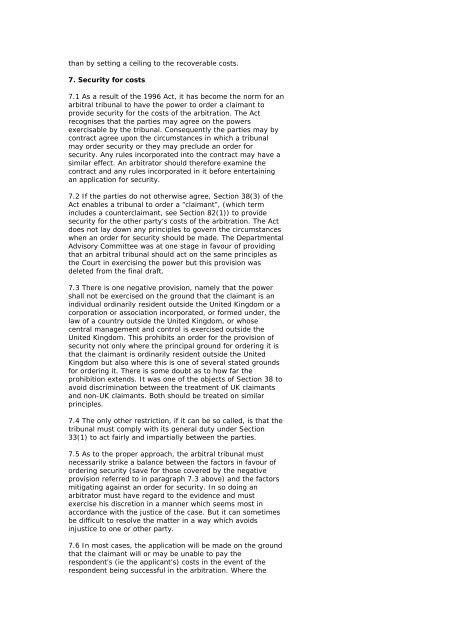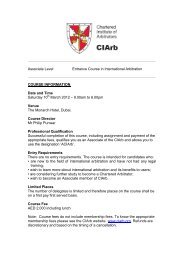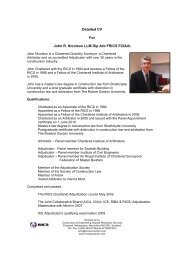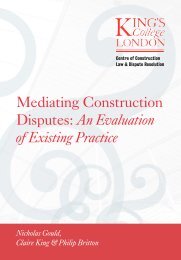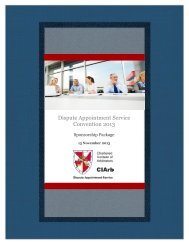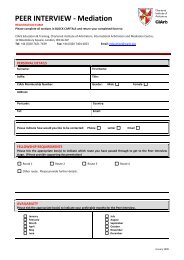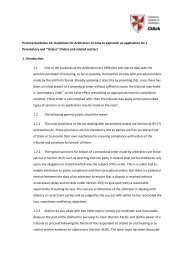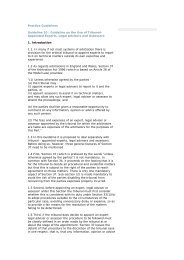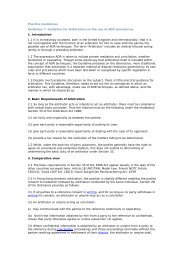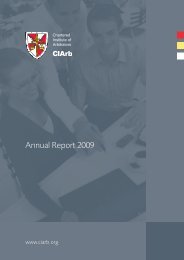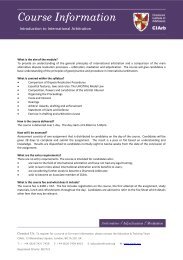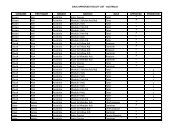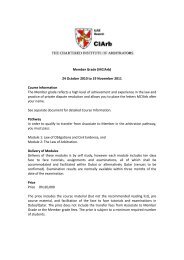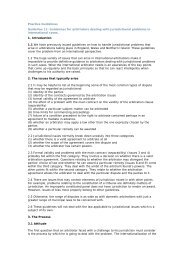Practice Guidelines - CIArb
Practice Guidelines - CIArb
Practice Guidelines - CIArb
You also want an ePaper? Increase the reach of your titles
YUMPU automatically turns print PDFs into web optimized ePapers that Google loves.
than by setting a ceiling to the recoverable costs.<br />
7. Security for costs<br />
7.1 As a result of the 1996 Act, it has become the norm for an<br />
arbitral tribunal to have the power to order a claimant to<br />
provide security for the costs of the arbitration. The Act<br />
recognises that the parties may agree on the powers<br />
exercisable by the tribunal. Consequently the parties may by<br />
contract agree upon the circumstances in which a tribunal<br />
may order security or they may preclude an order for<br />
security. Any rules incorporated into the contract may have a<br />
similar effect. An arbitrator should therefore examine the<br />
contract and any rules incorporated in it before entertaining<br />
an application for security.<br />
7.2 If the parties do not otherwise agree, Section 38(3) of the<br />
Act enables a tribunal to order a “claimant”, (which term<br />
includes a counterclaimant, see Section 82(1)) to provide<br />
security for the other party’s costs of the arbitration. The Act<br />
does not lay down any principles to govern the circumstances<br />
when an order for security should be made. The Departmental<br />
Advisory Committee was at one stage in favour of providing<br />
that an arbitral tribunal should act on the same principles as<br />
the Court in exercising the power but this provision was<br />
deleted from the final draft.<br />
7.3 There is one negative provision, namely that the power<br />
shall not be exercised on the ground that the claimant is an<br />
individual ordinarily resident outside the United Kingdom or a<br />
corporation or association incorporated, or formed under, the<br />
law of a country outside the United Kingdom, or whose<br />
central management and control is exercised outside the<br />
United Kingdom. This prohibits an order for the provision of<br />
security not only where the principal ground for ordering it is<br />
that the claimant is ordinarily resident outside the United<br />
Kingdom but also where this is one of several stated grounds<br />
for ordering it. There is some doubt as to how far the<br />
prohibition extends. It was one of the objects of Section 38 to<br />
avoid discrimination between the treatment of UK claimants<br />
and non-UK claimants. Both should be treated on similar<br />
principles.<br />
7.4 The only other restriction, if it can be so called, is that the<br />
tribunal must comply with its general duty under Section<br />
33(1) to act fairly and impartially between the parties.<br />
7.5 As to the proper approach, the arbitral tribunal must<br />
necessarily strike a balance between the factors in favour of<br />
ordering security (save for those covered by the negative<br />
provision referred to in paragraph 7.3 above) and the factors<br />
mitigating against an order for security. In so doing an<br />
arbitrator must have regard to the evidence and must<br />
exercise his discretion in a manner which seems most in<br />
accordance with the justice of the case. But it can sometimes<br />
be difficult to resolve the matter in a way which avoids<br />
injustice to one or other party.<br />
7.6 In most cases, the application will be made on the ground<br />
that the claimant will or may be unable to pay the<br />
respondent’s (ie the applicant’s) costs in the event of the<br />
respondent being successful in the arbitration. Where the


